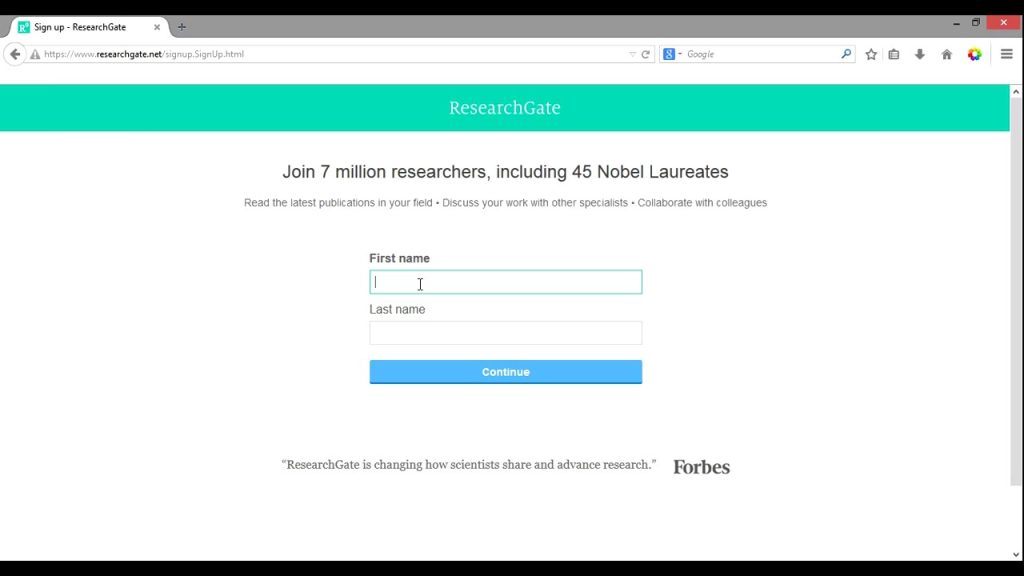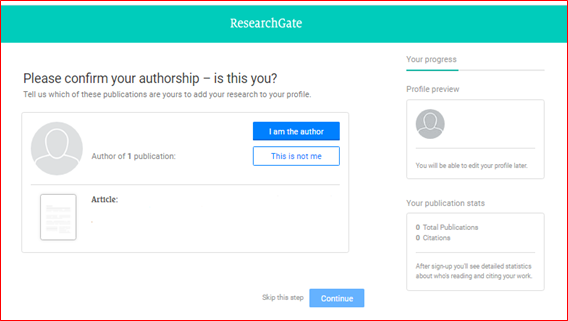ResearchGate is a prominent academic social networking platform that has revolutionized the way researchers and scholars connect, collaborate, and share their work. As a go-to destination for academic professionals, it has become an essential tool for building a strong research network, staying up-to-date with the latest developments in your field, and showcasing your research achievements. In this comprehensive guide, we will delve into the intricacies of ResearchGate Account Creation, exploring its benefits, the step-by-step process, and the various features that can help you maximize your academic and professional growth.

Table of Contents
What is ResearchGate?
ResearchGate is a free-to-use, online platform that caters specifically to the needs of researchers, scientists, and academics. Launched in 2008, this social network has grown to become one of the largest and most influential platforms in the academic community, with millions of registered users from around the world. The platform allows users to connect with peers, share research findings, collaborate on projects, and stay informed about the latest developments in their respective fields.
The Importance of Academic Networking
In the fast-paced and ever-evolving world of academia, building a strong professional network is crucial for researchers and scholars. ResearchGate provides a powerful platform for academic networking, enabling you to connect with like-minded individuals, discover new research opportunities, and stay ahead of the curve in your field. By actively engaging with the ResearchGate community, you can benefit from the exchange of ideas, the fostering of collaborations, and the potential for new research ventures.
Benefits of Having a ResearchGate Account
Creating a ResearchGate account offers numerous benefits for researchers and scholars, including:
- Visibility and Discoverability: By establishing a presence on ResearchGate, you can increase the visibility of your research, making it more accessible to a wider audience of peers, potential collaborators, and industry professionals.
- Collaboration Opportunities: The platform facilitates the discovery of new research projects and enables you to connect with researchers who share your interests, leading to potential collaborations and joint ventures.
- Knowledge Sharing: ResearchGate allows you to share your research findings, publications, and datasets, contributing to the broader advancement of knowledge in your field.
- Professional Development: The platform offers resources and tools for professional development, such as access to research papers, job postings, and networking opportunities.
- Impact Measurement: ResearchGate provides metrics and analytics to help you track the impact of your research, including the number of citations, downloads, and research-related activities.
Creating a ResearchGate Account
Step-by-Step Guide to Account Creation
Creating a ResearchGate account is a straightforward process that can be completed in just a few steps:
- Visit the ResearchGate website (www.researchgate.net) and click on the “Join for Free” button.
- Fill out the registration form, providing your name, email address, and academic or professional affiliation.
- Verify your email address by clicking on the confirmation link sent to your inbox.
- Complete your profile by adding your research interests, educational background, and professional experience.
Verifying Your Academic Identity
ResearchGate places a strong emphasis on verifying the academic identity of its users. To do so, you will need to provide evidence of your academic or professional affiliation, such as an institutional email address or a copy of your business card or employee ID.
Completing Your Profile
Once your account is created, take the time to fully complete your ResearchGate profile. This includes adding details about your research interests, educational background, publications, and any ongoing projects or collaborations. A well-developed profile will help you connect with relevant researchers and increase the visibility of your work.

Customizing Your ResearchGate Profile
Adding Your Research Interests
One of the key features of ResearchGate is the ability to showcase your research interests and areas of expertise. By adding your research interests to your profile, you can increase the likelihood of being discovered by others who share similar interests, leading to potential collaborations and networking opportunities.
Uploading Your Publications and Projects
ResearchGate allows you to upload your research publications, including journal articles, conference papers, and preprints. This not only showcases your scholarly work but also helps to build your online academic reputation and increase the discoverability of your research.
Connecting with Other Researchers
The platform’s social networking features enable you to connect with other researchers, follow their work, and engage in discussions. By building a network of peers, you can stay informed about the latest developments in your field and potentially identify new research opportunities.
Finding and Connecting with Researchers
Searching for Researchers by Name, Affiliation, or Keyword
ResearchGate provides a powerful search function that allows you to find researchers based on their name, institutional affiliation, or specific keywords related to their work. This feature can be particularly useful when trying to identify potential collaborators or experts in a particular area of research.
Sending Connection Requests and Messages
Once you have identified researchers of interest, you can send them connection requests and initiate conversations. These interactions can lead to valuable exchanges of ideas, feedback on your research, and potentially even collaborative opportunities.
Joining Research Groups and Communities
ResearchGate also enables users to join research-focused groups and communities, providing a platform for discussions, resource sharing, and the exchange of ideas within specific academic disciplines or areas of study.
Sharing Your Research on ResearchGate
Uploading Research Papers and Preprints
ResearchGate allows you to upload your research papers, preprints, and other scholarly works, making them accessible to the broader academic community. This can help increase the visibility and impact of your research.
Sharing Data and Datasets
In addition to publications, you can also share your research data and datasets on ResearchGate, enabling other researchers to access and potentially build upon your work.
Collaborating on Research Projects
The platform’s collaborative features allow you to work on research projects with colleagues from around the world, facilitating the exchange of ideas, the sharing of resources, and the co-authorship of publications.

Using ResearchGate for Academic Collaboration
Co-authoring Papers
ResearchGate provides tools for researchers to collaborate on the co-authorship of research papers, enabling real-time editing, feedback, and version control.
Sharing Research Ideas and Feedback
The platform’s discussion forums and messaging system allow you to share your research ideas, seek feedback from your peers, and engage in constructive dialogues that can help refine and improve your work.
Building Professional Relationships
By actively participating in the ResearchGate community, you can build lasting professional relationships with other researchers, leading to future collaborations, mentorship opportunities, and career advancement.
The ResearchGate Publication Network
Publishing Research Papers on ResearchGate
In addition to uploading your existing publications, ResearchGate also allows you to publish your research papers directly on the platform, reaching a wider audience and potentially increasing the visibility and impact of your work.
Promoting Your Research to a Wider Audience
The platform’s features, such as the ability to share your publications on social media and track their performance, can help you promote your research to a broader academic and professional audience.
Measuring Research Impact
ResearchGate provides various metrics and analytics to help you track the impact of your research, including the number of citations, downloads, and engagement with your published works.
Ethical Considerations on ResearchGate
Plagiarism and Self-Plagiarism
It is important to ensure that all content shared on ResearchGate is original and properly attributed to avoid issues related to plagiarism and self-plagiarism.
Data Privacy and Security
When uploading and sharing research data or personal information on ResearchGate, be mindful of data privacy and security concerns, and adhere to applicable regulations and institutional policies.
Responsible Research Practices
Maintain high standards of ethical conduct and responsible research practices when engaging with the ResearchGate community, including respecting intellectual property rights and promoting transparency in research.

Limitations of ResearchGate
Potential Bias in Research Content
As a user-generated platform, ResearchGate may contain research content that is subject to potential bias or quality control issues, which should be considered when evaluating the information available on the platform.
Quality Control Issues
The platform’s open-access nature can lead to the dissemination of research that may not have undergone rigorous peer review or quality control measures, requiring users to exercise caution and critical thinking when engaging with the content.
Limited Access to Certain Content
While ResearchGate provides access to a vast amount of research content, some publications may be restricted or not available due to copyright and licensing agreements.
Tips for Maximizing ResearchGate
Effective Profile Optimization
Ensure that your ResearchGate profile is comprehensive, up-to-date, and showcases your research interests, publications, and achievements to maximize your visibility and discoverability within the academic community.
Building a Strong Research Network
Actively engage with the ResearchGate community by connecting with peers, participating in discussions, and collaborating on research projects to build a robust professional network.
Engaging with the ResearchGate Community
Regularly contribute to the platform by sharing your research, providing feedback, and participating in discussions to establish yourself as an active and valuable member of the ResearchGate community.
Get Started with ResearchGate
To create a ResearchGate account, visit the ResearchGate website and click on the “Join for Free” button. Follow the step-by-step process outlined earlier in this article to complete your account registration and profile setup.
Once your account is created, you can start exploring the platform, connecting with other researchers, and sharing your research work. Remember to regularly update your profile, engage with the community, and take advantage of the various features and tools available on ResearchGate to maximize the benefits of your academic networking experience.
Frequently Asked Questions
Q: Is ResearchGate free to use?
A: Yes, ResearchGate is a free-to-use platform for researchers and academics.
Q: Can I upload my publications to ResearchGate?
A: Yes, ResearchGate allows you to upload your research publications, including journal articles, conference papers, and preprints.
Q: How do I find and connect with other researchers on ResearchGate?
A: You can search for researchers by name, affiliation, or keyword, and then send them connection requests to initiate professional relationships.
Q: Can I collaborate on research projects through ResearchGate?
A: Yes, ResearchGate provides features that enable researchers to collaborate on joint research projects, including co-authoring papers and sharing data and resources.
Q: Is there a way to measure the impact of my research on ResearchGate?
A: Yes, ResearchGate offers various metrics and analytics to help you track the impact of your research, such as the number of citations, downloads, and engagement with your published works.

Conclusion
ResearchGate has emerged as a powerful platform for academic networking, collaboration, and the sharing of research. By creating a ResearchGate account and leveraging its features, you can enhance the visibility of your research, connect with like-minded peers, and unlock new opportunities for professional growth and advancement.
Whether you are a seasoned researcher or a rising academic, embracing ResearchGate can be a valuable step in your journey to expand your research network, collaborate with peers, and ultimately contribute to the advancement of knowledge in your field.




